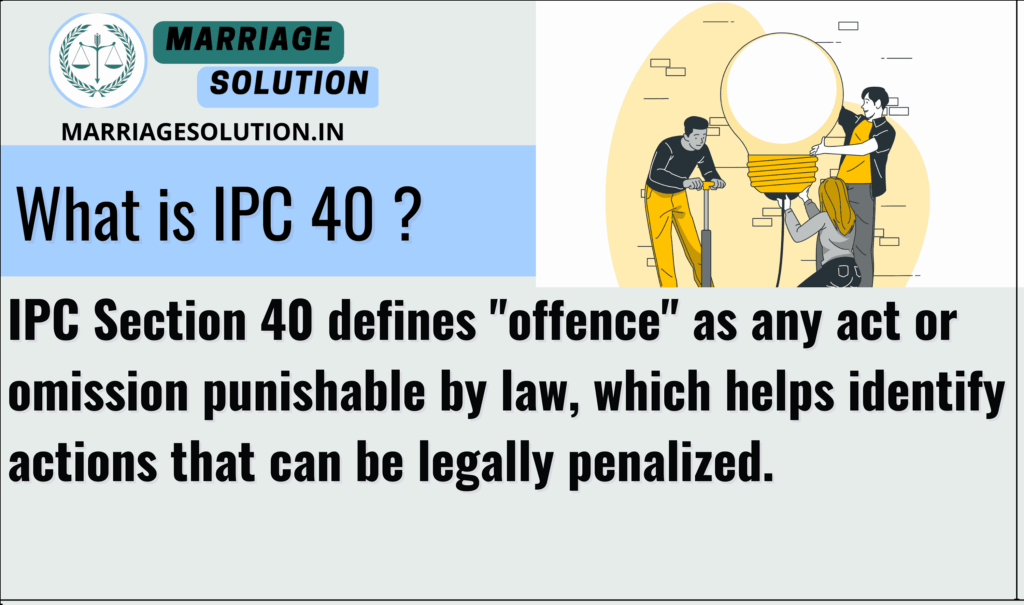Introduction of IPC 39
IPC Section 39 is an essential part of the Indian Penal Code. It defines the term “voluntarily,” which is crucial for understanding various offenses where an individual’s intent plays a key role. Knowing this definition helps in interpreting and applying the law accurately.
What is IPC Section 39 ?
IPC Section 39 states that a person acts “voluntarily” when they do something with free will and intent to cause a specific effect. This definition is important in legal contexts to determine if an action was done deliberately and with intent.

IPC Section 39 Overview
IPC Section 39 explains that a person is said to do something “voluntarily” if they do it with the free will and intent to cause a specific effect. This definition is important in legal contexts to determine whether an action was done deliberately and with intent.
Key Points Explained
- Definition of Voluntarily:
- Doing something with free will and intent to cause a specific effect.
- For example, if someone breaks a window to steal something, they acted voluntarily.
- Importance of Intent:
- The focus is on the person’s intention behind the act.
- Intent helps to differentiate between accidental and deliberate actions.
- Legal Implications:
- Determines the severity and nature of charges.
- Actions done voluntarily often carry heavier penalties compared to accidental acts.
- Examples in Law:
- Practical instances of how “voluntarily” is used in legal cases.
- In assault cases, proving the act was done voluntarily is crucial for conviction.
- Role in Prosecution:
- Helps in establishing a person’s guilt.
- Prosecutors must prove that the accused acted voluntarily to secure a conviction.
- Broad Application:
- Applies to various offenses where intent is a key factor.
- Whether it’s theft, assault, or fraud, proving voluntary action is essential.
IPC 39 Punishment
IPC Section 39 itself does not prescribe specific punishments or fines. It defines “voluntarily,” which helps in determining the appropriate punishment under other sections of the IPC based on the specific offense committed.
39 IPC bailable or not ?
Whether an offense involving IPC Section 39 is bailable depends on the specific crimes involved and the relevant sections of the IPC describing those crimes.
Section 39 IPC in short information
| Aspect | Details |
|---|---|
| Definition | A person does something “voluntarily” if they act with free will and intent to cause a specific effect. |
| Offense | Involvement in a criminal act with voluntary intent. |
| Punishment | No specific punishment under IPC Section 39; depends on related sections describing the actual offenses. |
| Bailable or Not | Depends on the specific offenses and related sections of the IPC. |
IPC 39 FAQs
What does IPC Section 39 define?
IPC Section 39 defines the term “voluntarily,” meaning to do something with free will and intent to cause a specific effect.
Does IPC Section 39 prescribe any punishments?
No, IPC Section 39 does not prescribe specific punishments. It helps determine intent, which is used with other sections to decide penalties.
Is an offense involving IPC Section 39 bailable?
The bailability of an offense involving IPC Section 39 depends on the specific crimes and related sections of the IPC.
How does IPC Section 39 affect legal proceedings?
It helps courts determine whether an act was done with voluntary intent, impacting the severity of charges and penalties.
If you need support with court proceedings or any other legal matters, don’t hesitate to reach out for assistance.
Court or any other marriage-related issues, our https://marriagesolution.in/lawyer-help-1/ website may prove helpful. By completing our enquiry form and submitting it online, we can provide customized guidance to navigate through the process effectively. Don’t hesitate to contact us for personalized solutions; we are here to assist you whenever necessary!
